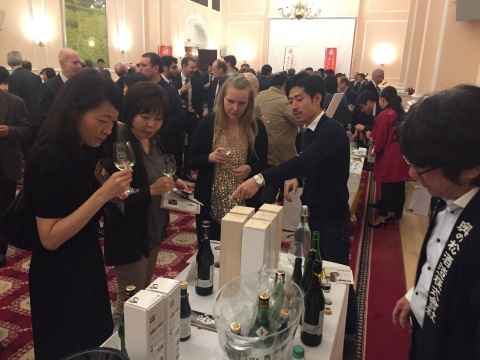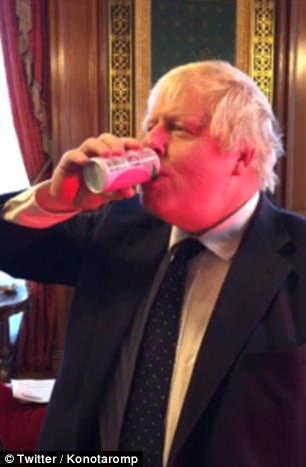South Korea to increase radiation testing of Japanese food

Less bluster, but no compromise seen as South Korean, Japan ministers meet in China
 A police officer stands guard near Japan and South Korea national flags at a hotel, where the South Korean embassy in Japan is.
A police officer stands guard near Japan and South Korea national flags at a hotel, where the South Korean embassy in Japan is.
August 20, 2019
SEOUL/TOKYO (Reuters) – South Korea and Japan have toned down the rhetoric but show little sign of compromise in a bitter political and economic dispute as their foreign ministers prepare to meet in China this week.
Relations between the two U.S. allies are at their worst in years, with a trade row rooted in a decades-old dispute over compensation for Koreans forced to work during Japan’s wartime occupation of South Korea.
Foreign ministers Kang Kyung-wha of South Korea, Taro Kono of Japan and Wang Yi of China will have trilateral meetings in Beijing from Tuesday evening to Thursday.
“We will have to actively express our position, but I am leaving with a heavy heart because the situation is very difficult,” Kang said before departing for China where a one-on-one meeting with Kono is set for Wednesday.
Their August meeting in Bangkok, where cameras captured the unsmiling pair making perfunctory handshakes, achieved little. A day later, Japan cut South Korea from a white list of favored trade partners, drawing retaliatory measures from Seoul.
“We expect to exchange views on various issues between Japan and the ROK, such as the issue of former civilian workers from the Korean Peninsula,” Japan’s Ministry of Foreign Affairs said in a statement, using the initials of South Korea’s official name, the Republic of Korea.
The Beijing talks would reaffirm Japan’s “close bilateral cooperation” with South Korea, as well as trilateral ties with the United States, the ministry said.
Since the Bangkok meeting, Seoul has urged a “cooling off period” and Japan approved shipments of a high-tech material to South Korea for the second time since imposing export curbs in July.
Nevertheless, the dispute is far from over.
South Korea warned this month it may consider revoking a military intelligence sharing pact with Japan, though an official at the presidential Blue House said on Tuesday no decision had been taken.
Seoul has also raised concerns about Japan’s handling of contaminated water from the Fukushima nuclear plant, a South Korea official said, though it may not bring it up in Beijing.
South Korea and other countries have restrictions on imports of produce from areas around the Fukushima site where three reactors melted down after an earthquake and tsunami in 2011.
NOT SO NICE FACE
While both sides have moderated their public statements, observers do not expect any major breakthroughs this week.
“I don’t think Japan is going to show a nice face to Seoul this time,” said one former Japanese diplomat familiar with the government’s position.
Japan believes South Korea’s economy is hurting more in the trade row, and “doesn’t mind waiting for further concessions from Seoul,” said the ex-diplomat.
Citing national security, Japan in July restricted exports of some key materials used in chips and displays made by South Korea firms, threatening to disrupt the global supply chain.
Later this month a decision to remove South Korea from Japan’s list of trading partners with fast-track access to a number of materials is scheduled to go into effect.
South Korea has responded by removing Japan from its own trade white list, and South Korean consumers are boycotting Japanese products and avoiding travel to Japan.
There also has been no progress in resolving the issue that triggered the latest chill in relations – a series of South Korean court rulings that ordered Japanese firms to compensate South Koreans forced to work for Japanese occupiers.
“I don’t think we can expect a big change in the situation as a result of tomorrow’s meeting because the forced labor issue is at the root of the deterioration in ties and there hasn’t been any new development regarding that,” said Kyungjoo Kim, a professor at Tokai University in Tokyo.
South Korea lawmaker Rep. Kim Kwang-soo calls for import ban on processed foods from Fukushima

‘Nuclear food referendum’: Taiwan’s softening of Fukushima ban under threat amid ballot calls

Promoting Fukushima Rice and Sake
On the Issue of Japan, Fukushima and Rice
In Japan, rice is life. The word for “life” is also the word for “meal” or “food.” The importance of rice to the Japanese people cannot be overstated. The word for rice has been called “emotive.” Damage to Japan’s rice crops goes beyond simple damage to the diet. To be confronted with a shortage of rice calls forth powerful feelings of deprivation in the Japanese. Japanese rice, irradiated by the events of “3/11,” is in danger.
“3/11” is what the Japanese call the series of deadly disasters which struck northern Japan in March of 2011; the earthquake, tsunami, and the Fukushima Daiichi nuclear power plant meltdown. Northern Japan was devastated and recovery will take many decades.
When the Fukushima Daiichi nuclear power facility was badly damaged by irradiation, local crops, including batches of rice grown in Fukushima, found to be badly affected by radiation, were swiftly removed from the market.
Five years after the quake, Fukushima rice producers still have difficulty marketing their produce. But the Japanese government, working in tandem with nonprofits and private organizations, has developed a positive and creative response to the Fukushima food crisis.
The Rice Peace Project Seminar, held on September 19, 2016 in New York, was inspired by the initiatives of a Japanese government supported campaign working together with non-profits, corporate projects, and organizations, including the NPO Project 88.
The NPO Project 88, which takes name from the 88 processes of rice production, mobilizes Japanese high-quality rice as an emergency relief food. Developing tasty, nutritious, non-GMO, low pesticide, and allergen-free, organic and gluten-free rice products is also central to NPO Project 88’s mission, helping to spread peace and disaster-relief in the world through rice.
The Rice Peace Project Seminar, held to publicize the efforts of the NPO Project 88, featured three speakers from Japan. Mrs. Akie Abe, spouse of Prime Minister Shinzo Abe, Mr. Hiroshi Sakurai, President of the sake brewery Asahi Shuzo, and Ms. Nari Takahashi, President of NPO Project 88. The speeches were followed by a sushi tasting prepared by Sushi Chef Yoichi Akashi of Kappo Akashi using Eco-rice as well as a tasting of “Dassai” sake, the sake Prime Minister Abe offered President Obama during the U.S. President’s 2014 visit to Japan.
Jeff Santos, CEO of the Santos Media Group who hosted the seminar, introduced Mrs. Akia Abe. Santos described Mrs. Abe as an activist. Abe is actively engaged in supporting the NPO Project 88 and in promoting Fukushima’s agricultural industry by creating Yamato No Kokoro sake from rice produced in Fukushima.
Mrs. Akie Abe said that in 2011, in the wake of the Tohoku earthquake, she realized the importance of supporting Japanese food production, especially rice. With the encouragement of US Ambassador to Japan, Caroline Kennedy, Abe began to support the production of Fukushima rice and sake,
Abe described the production of rice in Japan as highly political. She said that 150 years ago, after extensive warring between the Chochu and Aizu clans. the two prefectures began to cultivate rice for sake and to brew sake, jointly. The joint effort was successful and the two prefectures now live in harmony.
Abe said that for Japanese, now as always, rice and sake are spiritual foods. “In Japan, we like to get our hands dirty [working the land.] We are a part of nature. We owe our gratitude to nature. It is my pleasure to work with rice producers and sake producers.”
She closed with a warm invitation: “Please enjoy the sushi and sake tasting today and please also come to Japan to enjoy them!”
Hiroshi Sakurai, President of Sake Brewery Asahi Shuzo, opened with praise for Japanese sake in general and Asahi Shuzo’s sake in particular. “Sake has to be ‘oishii’ (delicious) If it is not delicious what is the point of creating it? And our sake is especially ‘oishii!’”
Sakurai said that he wanted to show two world leaders enjoying Japanese sake, Prime Minister Abe and US President Barack Obama. Sakurai’s photo array displayed pictures from the U.S. President’s 2014 visit to Japan.
Sakurai said that his company, Asahi Shuzo, had partnered with the king of rice producers, Yamada Nishiki, accounting for 6.5 percent of total rice production in Japan. He has a staff of 100 and his employees are the best. Production is entirely by hand- they do not use machines. Production is around the clock, 24/7, to produce “oishii” sake.
Sakurai said that rice production in Japan is very eco- friendly. They recycle all that remains from rice production, such as rice husks, used to make sembei, or rice milk.
In closing, he said: “We are eager to promote our sake and we hope you enjoy the tasting.”
Nari Takashashi, President of NPO Project 88. Ms. Takahashi said that rice was the first food served to Fukushima quake victims. It was sometimes all that aged survivors could eat. And for those who could not eat plain rice she and her company developed soft rice cakes. They were very popular, as were their cream puffs.
Takahashi said that some kids with allergies couldn’t eat even the rice cookies or cream puffs. So she developed allergy-free cookies made with rice powder and delivered to the schools. Kids loved them.
Takahashi said that the application for allergy free products goes well beyond Fukushima. Survivors of the Kumamoto quake this past April are their next potential customers. She believes there is a huge market for these products world wide, especially to disaster survivors and to millennials.
After this spirited set of speeches, it was no surprise that the sushi and sake tastings were extraordinary.
http://intpolicydigest.org/2016/10/06/on-the-issue-of-japan-fukushima-and-rice/
-
Archives
- May 2024 (182)
- April 2024 (366)
- March 2024 (335)
- February 2024 (345)
- January 2024 (375)
- December 2023 (333)
- November 2023 (342)
- October 2023 (366)
- September 2023 (353)
- August 2023 (356)
- July 2023 (362)
- June 2023 (324)
-
Categories
- 1
- 1 NUCLEAR ISSUES
- business and costs
- climate change
- culture and arts
- ENERGY
- environment
- health
- history
- indigenous issues
- Legal
- marketing of nuclear
- media
- opposition to nuclear
- PERSONAL STORIES
- politics
- politics international
- Religion and ethics
- safety
- secrets,lies and civil liberties
- spinbuster
- technology
- Uranium
- wastes
- weapons and war
- Women
- 2 WORLD
- ACTION
- AFRICA
- Atrocities
- AUSTRALIA
- Christina's notes
- Christina's themes
- culture and arts
- Fuk 2022
- Fuk 2023
- Fukushima 2017
- Fukushima 2018
- fukushima 2019
- Fukushima 2020
- Fukushima 2021
- general
- global warming
- Humour (God we need it)
- Nuclear
- RARE EARTHS
- Reference
- resources – print
- Resources -audiovicual
- World
- World Nuclear
- YouTube
-
RSS
Entries RSS
Comments RSS









